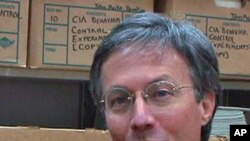Wikileaks has received widespread attention for releasing classified U.S. government documents. But if you want to examine notes from White House meetings with foreign leaders, read email from a Cabinet secretary, or look at photos taken by U.S. surveillance satellites… you can, thanks to the Freedom of Information Act, which grants access to declassified government records. Millions of those documents are available at the National Security Archive, a private research group in Washington.
Boxes filled with documents are stacked six shelves high in a storage room at the National Security Archive. These copies of government papers are only a small part of its collection, which also includes materials which can be viewed on the group’s website. The archive was started more than 25 years ago by a group of journalists and historians who used the Freedom of Information Act to get documents they needed for research. The act was passed by Congress in 1966 to make U.S. government agencies more accountable to the American public. However, some information is protected, including classified national defense or foreign policy materials, trade secrets and other confidential business information.
Today, the archive collects materials on a variety of topics, analyzes the information and publishes books about what they've found.
Director Tom Blanton says a retired spy even wrote part of his memoir using information from the archive.
“So it’s an interesting hybrid of different functions, all meant to make the Freedom of Information Act idea come true in the toughest area, the most closed area of American government and that’s national security," said Blanton.
Blanton says even when material is declassified, it can be difficult to get intelligence agencies to release sensitive information.
“Some of our requests we’ve have to pursue for 10, 15 years before we got the secrets released because the government fought back," he said.
This includes documents about questionable activities by the U.S. Central Intelligence Agency.
“The CIA back in the 1970’s got exposed for having been involved in assassination plots and mind control experiments using drugs and all kinds of shady dealings that that were really against the law here in the United States," said Blanton.
The archive has collected several million pages of government documents, including White House memos, Congressional records and court testimony. Topics include meetings between U.S. presidents and other world leaders, the fall of the Berlin Wall in Germany in 1989, and alleged terrorists detained in Guantanamo Bay, Cuba.
Blanton says some documents reveal surprising information.
“The Iraq war plan was a series of power-point briefings that the president had signed off on where they just assumed that they’d be out of Iraq in a couple of years after the invasion. They just assumed they’d be down to 5,000 troops,"he said. "They had no intention of planning for an occupation or taking responsibility for the security.”
Blanton says the archive’s collection of photos also tells a story. Especially popular are pictures of rock and roll legend Elvis Presley meeting with President Richard Nixon at the White House in 1970. Other photos from the early 1960’s show the U.S. preparing for a possible attack during the Cold War between the United States and the former Soviet Union.
Blanton, a former journalist, thinks too much government material is classified.
“We see our role as pushing back against that because we agree there are real secrets, the design of a nuclear warhead, a weapons system that would let a terrorist build such a weapon or use it against us, that should be a secret," he said. "But that’s a very small fraction of what gets stamped secret today.”
Blanton says the National Security Archive intends to keep pushing the U.S. government to spill the secrets that don't really need to be kept.




